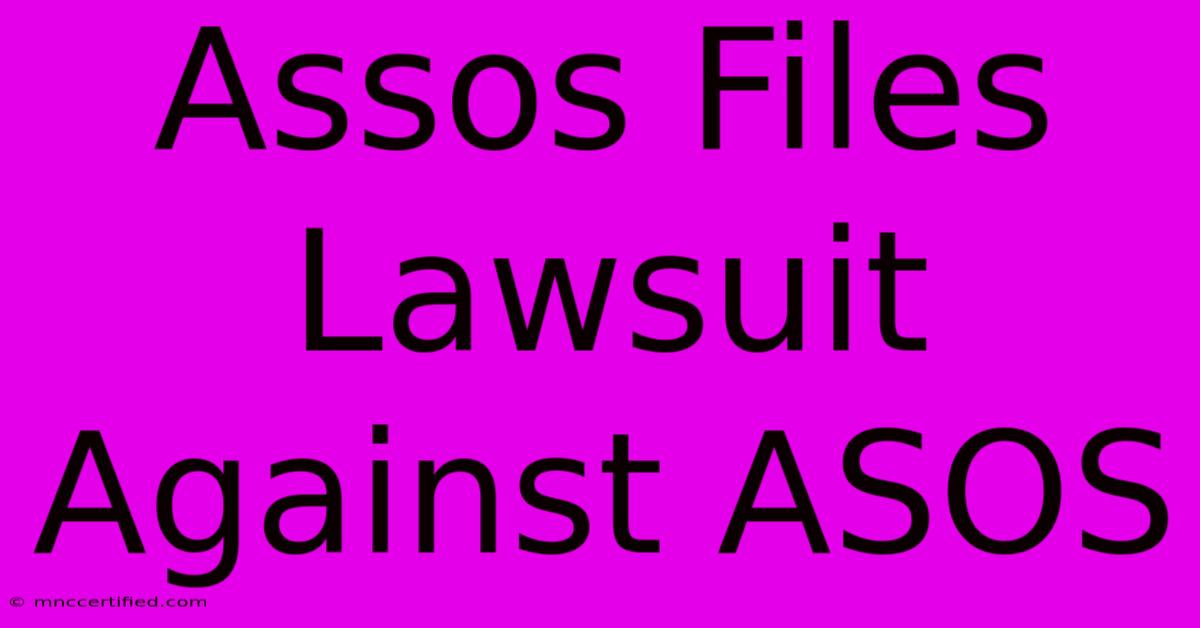Assos Files Lawsuit Against ASOS

Table of Contents
Assos Files Lawsuit Against ASOS: A Battle Over Brand Identity
The high-end cycling apparel brand, Assos of Switzerland, has filed a lawsuit against the online fashion retailer ASOS, alleging trademark infringement and unfair competition. This legal battle highlights the complexities of brand protection in the digital age and the potential pitfalls of similar-sounding brand names. This article delves into the details of the lawsuit, exploring the key arguments and potential implications for both companies.
The Core of the Dispute: Trademark Infringement
Assos, renowned for its high-performance cycling clothing, claims that ASOS's similar name creates confusion among consumers. This confusion, they argue, leads to brand dilution and harms their reputation. The core of their argument rests on the likelihood of consumers mistaking ASOS for Assos, potentially impacting sales and damaging their carefully cultivated brand image. The similarity in pronunciation and visual appearance of the names are central to Assos's claim. They contend that this similarity is not coincidental and constitutes intentional infringement.
Assos's Arguments: Beyond Name Similarity
Assos’s legal strategy likely goes beyond just the phonetic similarity. They will likely present evidence demonstrating:
- Consumer Confusion: This might include surveys showing a significant percentage of consumers confusing the two brands.
- Brand Recognition: They'll showcase their long history and established brand recognition in the cycling apparel market.
- Financial Harm: Assos will aim to quantify the potential financial losses incurred due to this alleged confusion.
- Intent: The lawsuit will likely delve into the history of ASOS’s naming and branding decisions, trying to establish whether the similarity was deliberate.
ASOS's Potential Defenses
ASOS, a global giant in online fashion retail, will undoubtedly mount a robust defense. Their strategy will likely focus on:
- Distinctiveness: They'll argue that their brand, ASOS, is sufficiently distinct from Assos, emphasizing the different market segments they cater to. While the names sound similar, the broader context of their respective businesses is markedly different.
- Lack of Intent: ASOS will need to demonstrate that the choice of their name was not intended to leverage Assos's brand recognition.
- Established Brand Identity: They'll highlight their own established brand identity and recognition, minimizing the potential for consumer confusion.
- Different Target Markets: ASOS will underscore the difference in their target audience and product offerings compared to Assos.
Implications and Future Outcomes
The outcome of this lawsuit has significant implications for both companies. For Assos, a successful outcome would protect their brand and potentially result in financial compensation. For ASOS, a loss could result in substantial financial penalties and damage to their brand reputation. Regardless of the outcome, this case sets a significant precedent regarding brand protection and the importance of careful consideration when choosing a brand name, particularly in the digital marketplace.
The Broader Implications for Brands
This case serves as a crucial reminder for all brands, particularly those with similar-sounding names, to proactively protect their intellectual property. Thorough trademark searches and careful consideration of potential conflicts are essential to avoid costly and time-consuming legal battles. This lawsuit emphasizes the ongoing challenges brands face in maintaining their brand identity in a competitive and increasingly digital world. The outcome will undoubtedly influence future branding decisions and legal strategies related to trademark infringement.
Keywords: Assos, ASOS, lawsuit, trademark infringement, brand protection, brand identity, consumer confusion, legal battle, online retail, cycling apparel, intellectual property, brand dilution, unfair competition.

Thank you for visiting our website wich cover about Assos Files Lawsuit Against ASOS . We hope the information provided has been useful to you. Feel free to contact us if you have any questions or need further assistance. See you next time and dont miss to bookmark.
Featured Posts
-
Commanders Vs Eagles Live Stream Guide
Nov 15, 2024
-
Tate Mc Raes So Close To What Album Drops In 2025
Nov 15, 2024
-
Transforming Spend Sap Industry Best Practices
Nov 15, 2024
-
Eva Longorias Post Trump Relocation
Nov 15, 2024
-
Vethor Token Price Prediction 2025
Nov 15, 2024